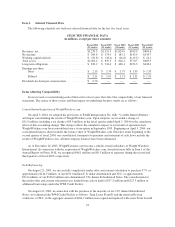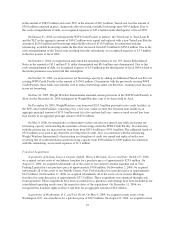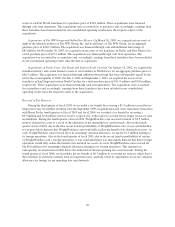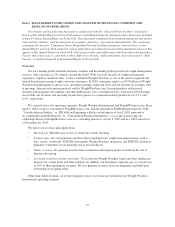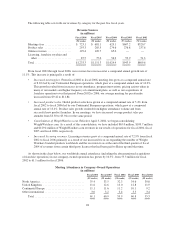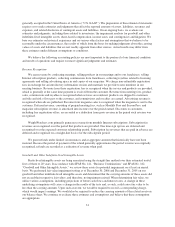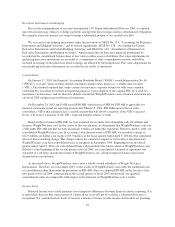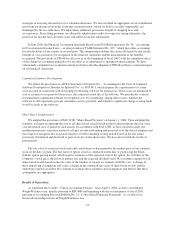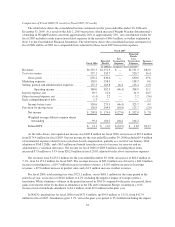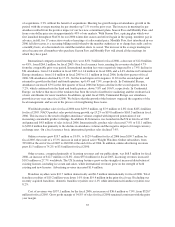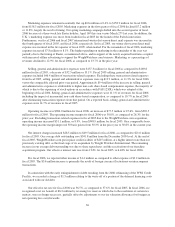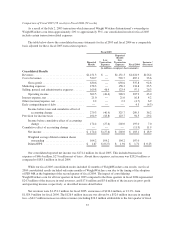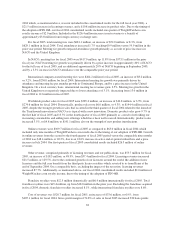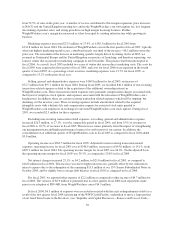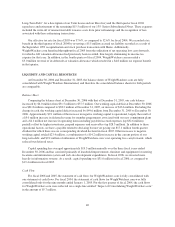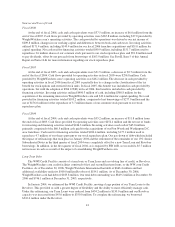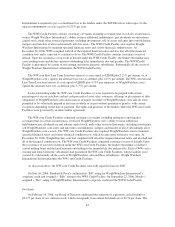WeightWatchers 2006 Annual Report Download - page 46
Download and view the complete annual report
Please find page 46 of the 2006 WeightWatchers annual report below. You can navigate through the pages in the report by either clicking on the pages listed below, or by using the keyword search tool below to find specific information within the annual report.strategies in assessing the need for a tax valuation allowance. We also establish an appropriate level of additional
provisions for income taxes in the event that certain positions, which we believe are fully supportable, are
challenged by the tax authorities. We adjust these additional provisions in light of changing facts and
circumstances. If our filing positions are ultimately upheld under audits by respective taxing authorities, the
provision for income taxes in future years will reflect favorable adjustments.
In June 2006, the Financial Accounting Standards Board issued FASB Interpretation No. 48, “Accounting
for Uncertainty in Income Taxes – an interpretation of FASB Statement No. 109,” which prescribes accounting
for and disclosure of uncertainty in tax positions. This interpretation defines the criteria that must be met for the
benefits of a tax position to be recognized in the financial statements and the measurement of tax benefits
recognized. The provisions of FIN 48 are effective as of the beginning of fiscal 2007, with the cumulative effect
of the change in accounting principle to be recorded as an adjustment to opening retained earnings. We have
substantially completed our evaluation and do not believe that the adoption of FIN 48 will have a material impact
on our financial statements.
Capitalized Software Development
We follow the provisions of AICPA Statement of Position 98-1, “Accounting for the Costs of Computer
Software Developed or Obtained for Internal Use”, or SOP 98-1, which requires the capitalization of certain
costs incurred in connection with developing or obtaining software for internal use. These costs are amortized to
cost of revenue over a period of three years, the estimated useful life of the software. We periodically evaluate
for impairment capitalized software development costs by considering, among other factors, whether the
software is still expected to provide substantive service potential, and whether a significant change is being made
or will be made to the software.
Share-Based Compensation
We adopted the provisions of FAS 123R, “Share-Based Payment” on January 1, 2006. Upon adopting this
standard, we began recognizing the cost of all share-based awards based on their estimated grant-date fair value
over the related service period of such awards. In accordance with FAS 123R, we have elected to apply the
modified prospective transition method to all past awards outstanding and unvested as of the date of adoption and
have begun to recognize the associated expense over the remaining vesting period based on the fair values
previously determined and disclosed as part of our pro forma disclosures. We have not restated the results of
prior periods.
The fair value of restricted stock units and vested shares is determined by the market price of our common
stock on the date of grant. The fair value of option awards is estimated on the date of grant using the Black-
Scholes option pricing model, which requires estimates of the expected term of the option, the volatility of the
Company’s stock price, the risk-free interest rate and the expected dividend yield. We recognize expense for all
share-based awards based on the fair value of the number of awards we estimate will fully vest. A change in
these underlying assumptions will cause a change in the estimated fair value of share-based awards and the
underlying expense recorded. We continue to evaluate these estimates and assumptions and believe that these
assumptions are appropriate.
Results of Operations
As explained above under “Critical Accounting Policies,” since April 3, 2004, we have consolidated
WeightWatchers.com, initially pursuant to FIN 46R and beginning with the second quarter of fiscal 2005,
pursuant to Accounting Research Bulletin No. 51, “Consolidated Financial Statements” as a result of our
increased ownership interest in WeightWatchers.com.
33



